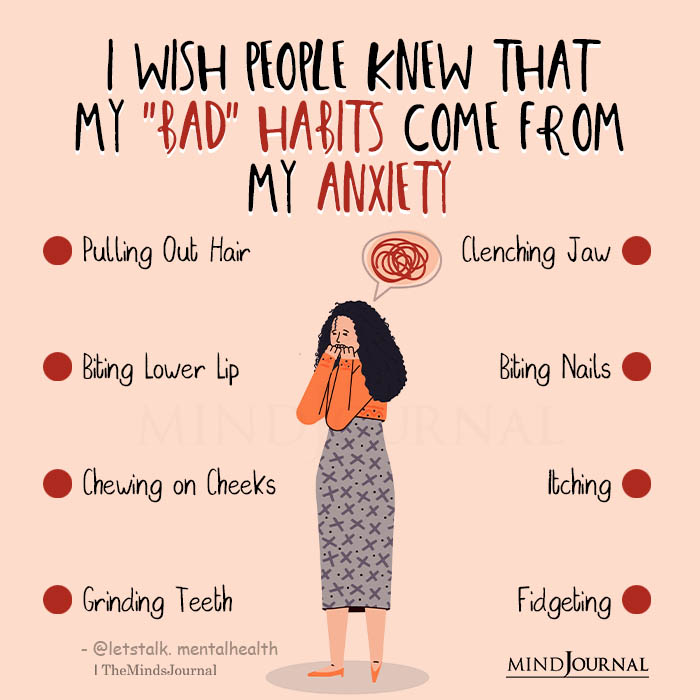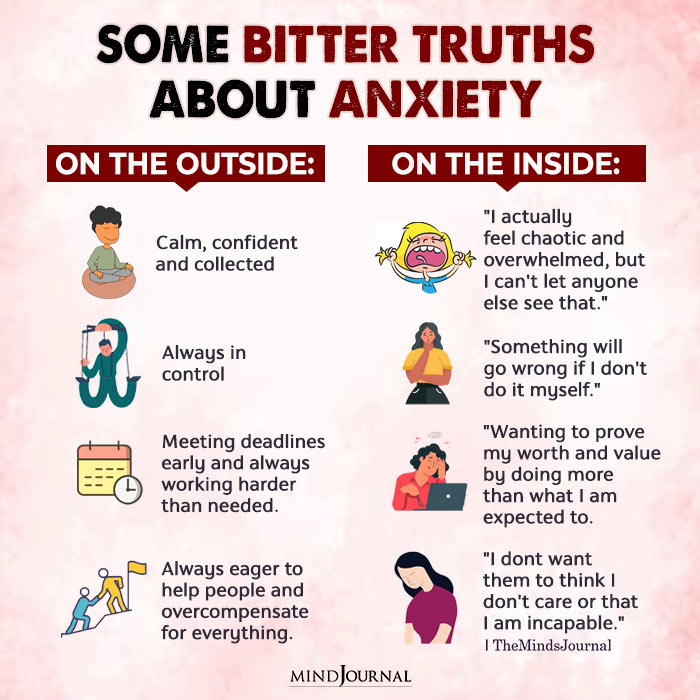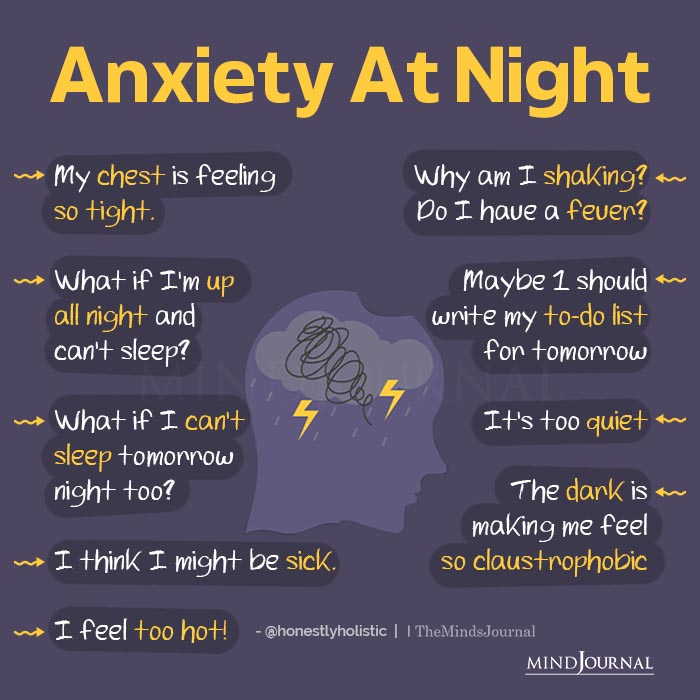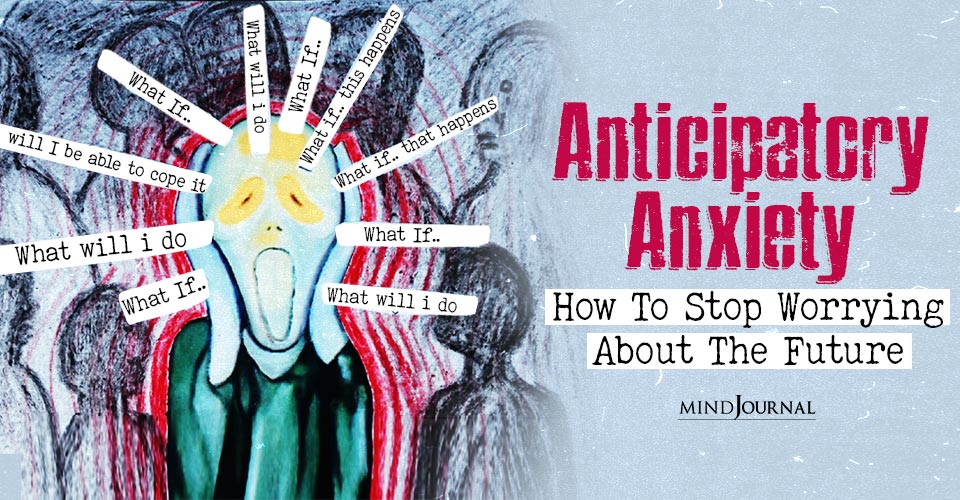Do you constantly worry about the future? Do you stay up all night before a big meeting? Do you think of every probable future outcome because you worry too much? Then you just might be struggling with anticipatory anxiety.
While most of us feel a bit worried about the future or get nervous before an event, like an interview, experiencing intense degrees of anticipatory anxiety can adversely affect our daily functioning and our ability to live a healthy, happy life.
What is anticipatory anxiety?
Anticipatory anxiety is simply excessive or uncontrollable worry about the future or an upcoming event. A form of anxiety disorder, it refers to our worry and fear that catastrophic or terrible things may happen to us or our loved ones in the future. While one can experience such anxiety in different scenarios, it mostly occurs when we are unable to control or predict a future outcome. Although such thoughts and worries are typically normal, when it turns into overwhelming fear and impairs your daily functioning, it can be a sign of anticipatory anxiety.
Anticipatory anxiety is a feeling of heightened anxiety, fear, apprehension and dread in anticipation of a negative experience in future. It is “a complex combination of a future-oriented cognitive state, negative affect, and autonomic arousal,” explain researchers. Individuals suffering from this form of anxiety often rehearse negative outcomes in their mind, even when it is not likely to happen.
Related: What Is Anxiety? 19 Signs, Causes, Self-Help Tips, FAQs

Some people may feel stressed and anxious for weeks before a future event. They may even feel extremely stressed when making an important decision. Their fight-flight-freeze system might become highly active and they may feel extremely nervous or have an anxiety attack or panic attack weeks, days or hours before the event. Having cold feet before marriage is perhaps the most common anticipatory anxiety example. However, anticipatory anxiety is a natural reaction to perceived threats in the future.
How anticipatory anxiety feels like
Do you keep making up “What If…?” scenarios in your mind?
What if my partner leaves me?
What if I get fired?
What if I fail my exams?
When we start thinking in terms of “What If…?”, we become hyperfocused on only the negative outcomes, which leads to heightened anxiety. It can rob us of the present moment and adversely affect our ability to be our best self by filling us up with unnecessary fear and doubt.
Although it is not a separate mental disorder, anticipatory anxiety is closely associated with social anxiety disorder and generalized anxiety disorder (GAD). It is also one of the most common symptoms for panic disorder. “Panic attacks and anticipatory anxiety are considered to be inter-correlated,” suggests a study. To put it simply, it is feeling anxious about having anxiety. It occurs when we have uncontrollable, intrusive thoughts about how possible negative future situations can trigger our anxiety.
The experience can be either chronic or situational. If you are continually worried about your future, then it is of the chronic type. But if you are worried about an upcoming date or job interview and how it can go downwards, then it is mostly of the situational variety. Regardless, this form of anxiety can be triggered by both major and minor upcoming events, such as giving an important presentation to clients or parking your car properly without hitting another car.
Related: How to Reclaim Your Power Absorbed by Anxiety: 5 Ways
A person can feel anticipatory anxiety about probable future events, such as –
- Job interviews
- A social event
- A date or marriage
- Presentations or meetings at the work place
- Tournaments, competitions or performances
- Divorce, break ups or relationship breakdowns
- The loss of a loved one
- Being harassed, abused, threatened or attacked by someone
- Natural disasters
It can feel extremely exhausting for the sufferer as episodes can sustain for months before an upcoming event. As they are more concerned about what they believe will happen than what may actually happen, these catastrophic and negative thoughts can cause a lot of distress, discomfort and frustration.

Signs of anticipatory anxiety
If you spend a lot of your time thinking about worst-case scenarios, then it is undoubtedly a sign of anticipatory anxiety. When you are unable to control these unwanted thoughts, then it can leave you feeling hopeless, helpless and frustrated. People who experience the symptoms are often struggling with some form of anxiety disorder that can vary in symptoms, duration and severity.
Here are some of the most common signs and symptoms of anticipatory anxiety –
- Intense feelings of fear, dread & apprehension
- Intrusive, irrational thoughts
- Constantly expecting bad outcomes in the future
- Being distracted easily
- Trouble concentrating
- Being overly pessimistic and looking for signs of threat or danger
- Difficulty managing mood and regulating emotions
- Being restless, irritable, jumpy or tense
- Loss of appetite and sleep (insomnia)
- Nausea and fatigue
- Muscle aches and tension
- Loss of interest in enjoyable activities
- Headaches, twitches, tremors and sweating
- Shortness of breath and heart palpitations
- Upset stomach or diarrhea and repeated urination
- Emotional numbness
- Rumination
Anticipatory anxiety can drastically limit our ability to live a happy life as we become focused on avoiding our fear and anxieties.
Related: Causes Of Mental Health Issues: 6 Common Risk Factors, According To Science
Causes of anticipatory anxiety
The exact causes of this form of anxiety have still not been clearly understood by experts. However, it can develop due to a combination of different factors, such as –
1. Genetic predisposition
Studies have found that anxiety disorders can be inherited as they are strongly influenced by genetics. So if a first degree family member suffers from anxiety then it is likely that you may develop it too.
2. Underlying mental illness
Struggling with other mental health issues, such as major depression, generalized anxiety disorder, panic disorder or specific phobias can make someone vulnerable to developing anticipatory anxiety.
3. Medical illnesses
Certain medical conditions or diseases, like thyroid disorders or heart conditions can lead to anxiety disorders and anticipatory anxiety about the future.
4. Medications and drugs
Some medications can result in anxiety as a side effect. Moreover, certain recreational drugs and alcohol can also lead to anxiety disorders. In fact, withdrawal from medications or drugs can also be a risk factor.
5. Trauma
Traumatic life experiences, such as childhood abuse, loss of a loved one or experiencing high levels of stress can trigger the onset of anxiety.
Related: 10 Anxious Behaviors That Could Actually Be Trauma Responses

Coping with anticipatory anxiety
Wondering how to deal with anticipatory anxiety? Here are a few helpful strategies to feel less stressed and anxious about your future:
1. Challenge your thoughts
Thoughts are just that… thoughts. They are not your reality. So instead of believing everything your mind conjures up, question your anxious thoughts. Ask yourself – are your fears realistic? What are the chances of the worst-case scenario occurring? Are you being overly pessimistic instead of having a balanced mindset?
Questioning your anxiety will help stop catastrophizing future events in your head, and help you become more realistic. It will also enable you to calm your thoughts and shift your focus to the present moment.
2. Reframe your thoughts
One of the simplest ways for overcoming anticipatory anxiety is refocusing your thoughts and shifting your mindset. Gain a new perspective and change how you see situations that trigger your anxiety. Consciously change your train of thought when anxious thoughts begin to arise. Intentionally think about the positive things that may occur at an upcoming event, instead of delving into the negative.
3. Initiate action
Thanks to anticipatory anxiety, we often avoid, hide and run away from situations and experiences that trigger our anxiety. This can make us miss out on opportunities and delay doing important tasks. This can further add to our stress and anxiety and make us dread our future even more.
Related: 33 Lies Your Anxiety Tells You

This is why it is important to take action and take control of the feared situation. Once you have dealt with the situation, you will not have to worry about it. So address your fears instead of running from it.
4. Practice relaxation and grounding techniques
Whenever anxiety takes over your mind, be deliberate about relaxing your mind and calming down. There are several relaxation and grounding techniques that can help you cope with anticipatory anxiety. Some of the most effective relaxation techniques that you should try include –
- Deep breathing
- Guided meditation
- Progressive muscle relaxation
- Guided visual imagery
Grounding techniques can also help you shift your focus away from anxious thoughts and bring it back to the present moment. Grounding exercises can be practiced anywhere and anytime to reduce anxiety. Some of the most common grounding techniques you can try include –
- Rubbing your palms together
- Clenching your fists and releasing them
- Stretching or exercising your body
- Focusing on your breath
- Taking a hot or cold shower
- Touching some objects nearby
- Savoring a meal or a drink
- Enjoying a familiar scent
- Imaging being with a loved one
- Listening to music or watching a movie
- Thinking about numbers
- Spelling backwards
5. Consult a therapist
Therapy is often the most realistic and helpful way of coping with anxiety. When you work with a therapist, they can help you identify your triggers, understand the causes and develop a treatment plan that can lead to complete recovery over time.
Some common therapy techniques for dealing with anticipatory anxiety may include –
- Cognitive behavioral therapy (CBT)
- Mindfulness-Based Stress Reduction (MBSR) and Mindfulness-Based Cognitive Therapy (MBCT)
- Exposure therapy
- Eye movement desensitization and reprocessing (EMDR)
- Panic-focused psychodynamic psychotherapy (PFPP)
Studies have found that “CBT appears to be both efficacious and effective in the treatment of anxiety disorders.”
Related: 10 Surprisingly Effective Natural Remedies for Anxiety

How to stop anticipatory anxiety: 15 Ways
Apart from the helpful strategies mentioned above, here are some other quick tips to help you overcome the symptoms of anticipatory anxiety –
- Acknowledge your anxiety and let it go instead if holding on to it
- Shift your focus to the positive aspects of the upcoming event
- Gather more information about the feared situation or experience to have a more realistic view
- Avoid isolating yourself and sitting & worrying. Socialize more often with positive people
- Observe how you talk to yourself and practice positive self-talk
- Maintain a daily journal to release your anxious thoughts
- Practice gratitude by listing down all the things you are thankful for
- Talk openly and honestly with a trusted loved one about your issues
- Make sure to meet your basic needs, follow a healthy diet and get adequate sleep
- Avoid taking recreational drugs & alcohol, smoking cigarettes or consuming excessive caffeine & sugar
- Make sure to remain physically active and exercise regularly
- Practice self-love, self-care and self-compassion
- Practice Yoga
- Practice mindfulness and bring your awareness to the present moment
- Take a walk outside and spend some time in nature
Takeaway
Nobody knows how the future is going to unfold and that can surely be scary for most of us. While being a little worried about the future is natural, being engulfed by anticipatory anxiety can actually impair your daily functioning.
However, practicing the above mentioned self-help strategies, seeking therapy and being kind to yourself can help you overcome the symptoms and build a better life for yourself.
Related: 25 Quick Ways To Boost Your Mood When You’re Having A Bad Day











Leave a Reply